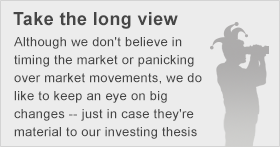
The Dow Jones Industrial Average (DJINDICES: ^DJI) stumbled in morning trading before rising 16 points into the green by early afternoon Wednesday.
The Dow's fluctuations were driven first by a disappointing labor market report from payroll company ADP, indicating that this Friday's jobs report from the U.S. Labor Department may be disappointing. The market then turned higher after the Institute for Supply Management nonmanufacturing report indicated stronger than expected output in the service sector of the U.S. economy.
Shares of Visa (V 0.19%), the top-weighted company on the Dow, dropped as far as $209.50 before rebounding slightly. At 1 p.m. EDT, the credit card giant was trading down 0.4%.
The drop today continues the short-term trend for the company, which is down over 1.5% over just the past two days. The second-largest payment network company, MasterCard (MA +0.49%), has also declined, but by about 50% less than Visa.
Short-term turmoil is long-term opportunity
First and foremost, nothing in the past week has meaningfully altered the business fundamentals at Visa or MasterCard. That said, a couple news items are contributing to Visa's recent slide.
Earlier this week, Visa announced that CFO Byron Pollitt would retire within the next 12 months. A shake-up in leadership at a level this high can be a risky proposition, and the markets have reacted to the news as such.
Most analysts expect Visa will find a suitable, shareholder-friendly replacement, and the long-term outlook remains unchanged. But the fact remains that with change comes uncertainty, and the investing community doesn't buy into uncertainty.
Visa also announced this week that it will change the way it labels prepaid products. Many consumer rights groups have argued that prepaid cards can be misleading to consumers, as the fees and costs of the cards can be ambiguous, poorly communicated, and way too high.
To address this problem, Visa will roll out a standard emblem that will be affixed to cards carrying its logo that meet certain consumer-friendly standards. These cards will have features including flat monthly fees, no overdraft fees, and no withdrawal or usage fees.
The risk for Visa in this decision is that it could cut into profits at the finance companies issuing the cards. Visa doesn't actually make money from these fees, it only operates the network that processes the transactions.
The card issuer, typically a bank, sets and keeps the fees. If the card issuers are not making enough money from the products, they could switch to a rival payment network.
Why take such the risk?
There are two good reasons for Visa to make this move. First, it's the right thing to do. There is no reason for a global, highly reputable brand like Visa to tolerate misleading, deceptive, or abusive practices. From a business perspective, consumers will recognize Visa's new label as a standard for quality, and will gravitate to the cards certified as consumer-friendly. Competitors that don't follow suit will likely be left behind.

Second, prepaid cards have the potential to unlock the massive market of underbanked individuals in the U.S. and abroad. These individuals typically have lower incomes and often do not even have a simple checking account.
Prepaid cards can be loaded in a physical store or online, and can be used just like an debit card, except without a bank account.
Visa is even using the prepaid technology to link cards to cell phone accounts in Africa, bringing the modern financial system to the most remote and undeveloped regions in the world.
For Visa, MasterCard, and the card issuers, opening up this market is a huge opportunity for growth and long-term profits.
